
Journal of the ASABE
Scope & Guideline
Transforming Research into Real-World Applications
Introduction
Aims and Scopes
- Agricultural Engineering Innovations:
This area includes advancements in machinery, tools, and systems designed to improve efficiency in agricultural processes, such as planting, harvesting, and irrigation. - Precision Agriculture Technologies:
Research in this scope involves the use of advanced technologies, such as GPS, remote sensing, and data analytics to optimize agricultural practices and resource management. - Soil and Water Management:
The journal addresses methodologies for effective soil and water conservation, drainage systems, and irrigation practices to enhance crop yield while minimizing environmental impact. - Crop and Soil Interaction Studies:
Investigations into how various factors affect crop growth and soil health, including nutrient management, pest control, and the impacts of climate change. - Post-Harvest Processing and Quality Assessment:
Research focused on the technologies and methods that enhance the quality and safety of post-harvest products, including storage, processing, and packaging. - Sustainable Agricultural Practices:
The journal promotes research that explores sustainable methods for agriculture that improve productivity while reducing environmental footprints.
Trending and Emerging
- Machine Learning and Data Analytics in Agriculture:
Recent publications increasingly leverage machine learning algorithms and data analytics to enhance decision-making in crop management, pest control, and resource optimization. - Integration of IoT in Precision Agriculture:
The emergence of Internet of Things (IoT) technologies is transforming agricultural practices, with studies focusing on smart sensors and automated systems for real-time monitoring. - Environmental Impact Assessments:
There is an increasing emphasis on understanding and mitigating the environmental impacts of agricultural practices, including studies on greenhouse gas emissions and water quality. - Biological Waste Management and Circular Economy:
Research is trending towards innovative methods for managing agricultural waste and integrating circular economy principles to enhance sustainability. - Robotics and Automation in Agriculture:
The rise of robotics in agricultural applications, such as autonomous machinery for planting and harvesting, is becoming a significant focus area for future research.
Declining or Waning
- Traditional Crop Management Practices:
Research on conventional methods of crop management, such as tillage and chemical fertilization, is becoming less prominent as more studies focus on precision agriculture and sustainable practices. - Basic Agricultural Machinery Design:
There has been a noticeable decrease in papers focused solely on the design of standard agricultural machinery, as the field shifts towards smart and automated systems. - Labor-Intensive Agricultural Techniques:
As technology advances, research on labor-intensive techniques is declining, reflecting a broader trend towards automation and mechanization in agriculture. - General Soil Fertility Studies:
The focus on general soil fertility without specific context or innovative methodologies is waning, as more targeted and technology-driven approaches gain traction.
Similar Journals
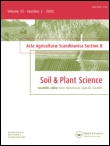
ACTA AGRICULTURAE SCANDINAVICA SECTION B-SOIL AND PLANT SCIENCE
Transforming Research into Real-World Agricultural SolutionsACTA AGRICULTURAE SCANDINAVICA SECTION B-SOIL AND PLANT SCIENCE, published by Taylor & Francis AS, is a distinguished journal dedicated to the fields of Agronomy, Crop Science, and Soil Science. With an impressive impact factor, and categorized in Q2 for both Agronomy and Crop Science and Soil Science as of 2023, this journal is an essential resource for researchers, professionals, and students aiming to advance their understanding of soil-plant interactions and sustainable agricultural practices. Operating since 1992 and continuing through to 2024, ACTA aims to publish high-quality, peer-reviewed research that encourages the applicability of advanced scientific knowledge in real-world agricultural settings. While the journal is not open access, it remains widely accessible through institutional subscriptions, reflecting its commitment to disseminating essential findings and fostering innovation in soil and plant science worldwide. Nestled in the vibrant academic environment of Norway, ACTA AGRICULTURAE SCANDINAVICA serves as a key platform for nurturing groundbreaking research that informs sustainable agricultural policies and practices globally.
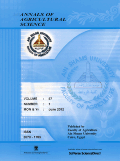
ANNALS OF AGRICULTURAL SCIENCES
Pioneering Research in the Heart of AgricultureANNALS OF AGRICULTURAL SCIENCES, published by Elsevier, stands as a leading open access journal dedicated to the multifaceted field of agricultural sciences. Since its inception in 2011, this journal has served as a pivotal platform for the dissemination of high-quality research, covering areas such as agronomy, animal science, horticulture, food science, plant science, and soil science. With an impressive Q1 ranking across multiple disciplines and notable positions in Scopus Ranks—including #6 in Animal Science and Zoology and #3 in Horticulture—this journal is recognized globally for its significant contribution to advancing agricultural innovations. The journal caters to a diverse audience of researchers, professionals, and students, providing them with open access to cutting-edge studies that address critical issues in agricultural productivity and sustainability. Its commitment to high-impact research ensures that articles contribute meaningfully to the scientific community, fostering advancements in agricultural practices and policies.
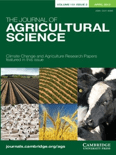
JOURNAL OF AGRICULTURAL SCIENCE
Pioneering Research in Crop and Animal ScienceJOURNAL OF AGRICULTURAL SCIENCE, published by Cambridge University Press, stands as a pivotal resource in the field of agricultural research. With a rich history dating back to 1905, this esteemed journal has consistently delivered cutting-edge scholarly articles that address pressing issues in agronomy, crop science, animal science, and genetics. Currently holding a Q2 ranking in Agronomy and Crop Science and Animal Science and Zoology, and a Q3 in Genetics, it reflects a robust impact within the academic community, contributing to innovative practices and technologies in agriculture. Indexed in Scopus, its authors benefit from broad visibility, supported by a strong readership among researchers, professionals, and students alike. While the journal does not currently offer open access, its rigorous peer-review process ensures that published works meet the highest scholarly standards, fostering a rich environment for knowledge exchange and advancement in agricultural science.

AgriEngineering
Exploring the Intersection of Engineering and AgronomyAgriEngineering is a premier Open Access journal, published by MDPI, focusing on innovative research across the disciplines of agronomy, horticulture, food science, and engineering. Established in 2019 and headquartered in Basel, Switzerland, this journal has rapidly gained recognition, evidenced by its robust performance in the Scopus rankings and its positioning in Q1 and Q2 quartiles of key categories, including Horticulture and Agronomy. With a commitment to disseminating high-quality research that advances agricultural engineering practices, AgriEngineering provides a platform for researchers, professionals, and students to explore cutting-edge developments aimed at enhancing food production systems and sustainability. Its Open Access model ensures wide-reaching accessibility to vital research outcomes, empowering global collaboration and innovation in the field. For more information on submission and access, you can visit the AgriEngineering website.
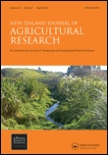
NEW ZEALAND JOURNAL OF AGRICULTURAL RESEARCH
Cultivating Knowledge in Soil and Crop ManagementNEW ZEALAND JOURNAL OF AGRICULTURAL RESEARCH is a prestigious, peer-reviewed journal published by Taylor & Francis Ltd that has been at the forefront of agricultural science since its inception in 1958. With a strong focus on the fields of Agronomy and Crop Science, Animal Science and Zoology, Plant Science, and Soil Science, this journal has established itself in the academic community, achieving a notable Q2 ranking in various agricultural categories as of 2023. The journal thrives on its commitment to disseminating cutting-edge research and innovative practices that address contemporary challenges in agriculture. Although it does not currently offer an open access option, its valuable contributions can be accessed through various academic platforms, ensuring that vital research reaches a wide audience of researchers, professionals, and students globally. The journal's continued relevance and authority are reflected in its strong Scopus rankings, further emphasizing its role as a critical journal within the agricultural sciences.

Romanian Agricultural Research
Pioneering Research in Crop Management and SustainabilityRomanian Agricultural Research is a prominent academic journal dedicated to advancing the field of agricultural science with a specific focus on agronomy and crop management. Published by the NATL AGRICULTURAL RESEARCH & DEVELOPMENT INST in Romania, this journal has established itself as an important resource within its discipline, evidenced by its Q3 ranking in the Agronomy and Crop Science category for 2023. With its ongoing publication since 2008, the journal provides a platform for researchers and professionals to disseminate their findings and share innovative practices that address the challenges faced in agricultural development. Although it operates under a non-open access model, Romanian Agricultural Research commits to rigorous peer-review processes, ensuring the high-quality content that enhances the academic community’s knowledge base. The journal's objective is to foster dialogues surrounding sustainable agriculture, improve crop yield, and contribute to the enhancement of agricultural practices globally. Researchers, professionals, and students will find this journal to be an invaluable repository of knowledge and a catalyst for future agricultural innovations.

APPLIED ENGINEERING IN AGRICULTURE
Driving Agricultural Innovation with High-Quality Research.APPLIED ENGINEERING IN AGRICULTURE is a peer-reviewed journal published by the American Society of Agricultural and Biological Engineers, dedicated to advancing the field of agricultural engineering through the dissemination of high-quality research. With an ISSN of 0883-8542 and an e-ISSN of 1943-7838, this journal has been a key resource since its inception in 1985, serving as a vital platform for scholars and practitioners to share innovative ideas and practical solutions that enhance productivity and sustainability in agricultural practices. The journal is ranked in the Q3 category for Engineering (miscellaneous) as of 2023, and is positioned within the 43rd percentile of the general engineering rankings in Scopus. While not currently an open-access journal, APPLIED ENGINEERING IN AGRICULTURE remains crucial for researchers and professionals looking to explore diverse engineering solutions that address the complexities of modern agriculture, making it an invaluable resource for anyone committed to improving agricultural systems through engineering advancements.
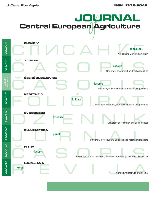
Journal of Central European Agriculture
Fostering Innovation in Agronomy and Animal ScienceThe Journal of Central European Agriculture, with ISSN 1332-9049 and E-ISSN 1332-9049, is an esteemed platform published by UNIV ZAGREB, FAC AGRICULTURE that caters to the dynamic fields of agronomy, crop science, and animal science. Since its establishment in 2000, this Open Access journal has played a crucial role in disseminating critical research findings while fostering collaboration among academics, researchers, and professionals within the agricultural community. The journal, which is based in the heart of Croatia, spans a rich history of scholarship, with its content available for free to readers and contributors alike. As reflected in its current standings, the journal has achieved a Quartile 3 ranking in Agronomy and Crop Science and Quartile 4 in Animal Science and Zoology for the year 2023, indicating its growing influence within these disciplines. With Scopus ranks placing it in the 32nd percentile among its peers, the Journal of Central European Agriculture is committed to advancing agricultural sciences not only in Central Europe but globally as it prepares for its converged years from 2007 through 2024. This journal serves as a vital resource for innovative research, practical applications, and a deeper understanding of agricultural challenges and solutions.
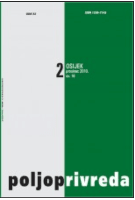
Poljoprivreda
Cultivating innovation in crop science and agronomy.Poljoprivreda is a distinguished open-access journal dedicated to the field of agronomy and crop science, published by the FAC Agriculture Osijek in Croatia. Since its inception in 2000, the journal has been committed to disseminating high-quality research that informs both academic and practical advancements in agriculture. With an ISSN of 1330-7142 and an E-ISSN of 1848-8080, Poljoprivreda provides a vital platform for researchers, professionals, and students to engage with the latest findings and methodologies in agronomy, contributing significantly to the enhancement of agricultural practices in Croatia and beyond. Although currently ranked in the 22nd percentile within its category according to Scopus, the journal aspires to elevate its standing by welcoming innovative research that addresses contemporary challenges within the agricultural sciences. By fostering open access since 2000, Poljoprivreda ensures that its scholarly content is freely available, promoting wider dissemination and collaborative opportunities among researchers globally.

PAKISTAN JOURNAL OF AGRICULTURAL SCIENCES
Empowering Agricultural Scholars with Vital InsightsWelcome to the Pakistan Journal of Agricultural Sciences, a prominent platform for disseminating vital research findings in the fields of agronomy, crop science, food science, plant science, and soil science. Published by the prestigious University of Agriculture in Faisalabad, this journal aims to enhance the scientific discourse surrounding agricultural innovation and sustainability in Pakistan and beyond. With an ISSN of 0552-9034 and E-ISSN of 2076-0906, the journal serves as a valuable resource for researchers, professionals, and students interested in cutting-edge agricultural developments. As of 2023, the journal is ranked in the Q3 category for Agronomy and Crop Science as well as Food Science and positioned in Q4 for Plant and Soil Science, highlighting its growing impact within a competitive academic landscape. While the Pakistan Journal of Agricultural Sciences is not currently open access, it provides a comprehensive archive of research converging from 2011 to 2024, ensuring that critical knowledge remains accessible to those striving to advance the agricultural sciences. Join us in our mission to foster innovation and support sustainable practices in agriculture.